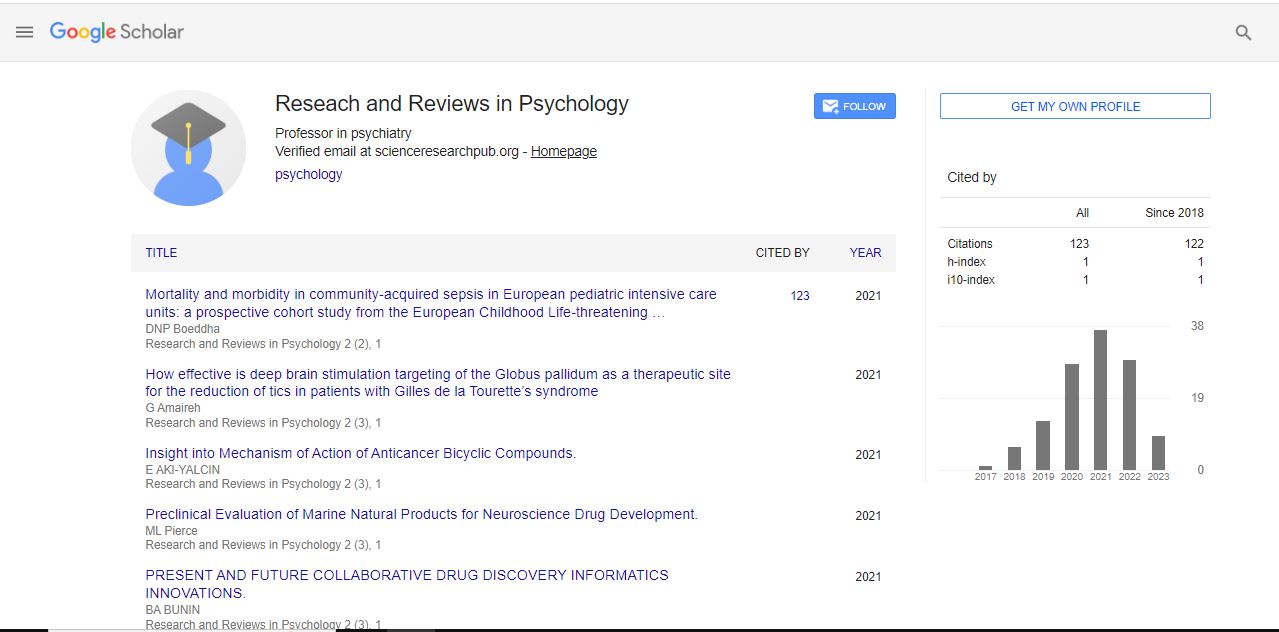Perspective, Res J Econ Vol: 4 Issue: 2
Unlocking the Power of Mental Imagery in Psychology: Exploring the Depths of the Mind
Luis Gaudino*
1Department of Psychiatry, University of Michigan, Michigan, United States of America
*Corresponding Author: Luis Gaudino,
Department of Psychiatry, University of
Michigan, Michigan, United States of America
E-mail: luis@gau.edu
Received date: 24 May, 2023, Manuscript No. RRPY-23-107429;
Editor assigned date: 26 May, 2023, PreQC No. RRPY-23-107429 (PQ);
Reviewed date: 09 June, 2023, QC No. RRPY-23-107429;
Revised date: 16 June, 2023, Manuscript No. RRPY-23-107429 (R);
Published date: 23 June, 2023 DOI: 10.4172/rrpy.1000341
Citation: Gaudino L (2023) Unlocking the Power of Mental Imagery in Psychology: Exploring the Depths of the Mind. Res Rev Phys 4:2.
Description
Mental imagery, the ability to generate and manipulate mental representations of objects, events, or concepts, plays a vital role in human cognition. This study delves into the fascinating realm of mental imagery within the field of psychology, uncovering its definition, underlying processes, significance, and applications. By harnessing the power of the imagination, mental imagery provides a window into the depths of the mind and offers profound insights into human perception, memory, problem-solving, and even emotional experiences.
Understanding mental imagery
Mental imagery refers to the process of creating vivid mental representations in the absence of direct sensory input. It involves activating and manipulating sensory, perceptual, and conceptual information in the mind. Mental images can be visual, auditory, olfactory, gustatory, or tactile, allowing individuals to simulate experiences in their mind's eye or ear. These mental representations can be voluntary or spontaneous, and they can be influenced by external stimuli, memories, or the individual's imagination.
The cognitive processes of mental imagery
Research suggests that mental imagery engages various cognitive processes. Perception and memory play necessary roles in mental imagery, as individuals draw upon their perceptual experiences and stored knowledge to construct mental representations. The brain regions involved in perception and memory, such as the visual cortex or the hippocampus, may be activated during mental imagery tasks.
The generation and manipulation of mental images involve executive functions, including attention, working memory, and cognitive control. Attention directs focus to specific details or features of the mental image, while working memory helps maintain and manipulate the mental representation. Cognitive control facilitates the regulation of mental processes, allowing individuals to shape and transform their mental imagery consciously.
The significance of mental imagery
Mental imagery holds significant implications for various areas of psychology. In perception and cognition, mental imagery provides insights into how individuals process and represent information. By studying mental imagery, researchers can investigate the relationship between mental representations and perceptual experiences, leading to a deeper understanding of sensory processing and object recognition. In memory and learning, mental imagery aids encoding and retrieval processes. The creation of vivid mental images can enhance memory performance by creating stronger and more distinctive memory traces.
Mnemonic techniques, such as the method of loci, rely on mental imagery to improve memory recall by associating information with visualized locations or images. Problem-solving and creativity also benefit from mental imagery. Mental simulation allows individuals to mentally explore different scenarios and potential solutions, aiding in planning, decision-making, and problem-solving tasks. Artists, writers, and inventors often employ mental imagery to generate and refine their creative ideas, visualizing their artistic visions or imagining novel concepts. Emotion and mental imagery are closely intertwined. Emotional experiences can elicit vivid mental images that evoke corresponding feelings. For example, recalling a joyful memory can generate a mental image that reactivates the associated positive emotions. Therapeutically, mental imagery techniques are employed in cognitive-behavioral therapies to modify emotional states, reduce anxiety, and enhance well-being.
Applications and future directions
Mental imagery has applications in various fields, including sports psychology, education, and mental health. Athletes use mental imagery to enhance performance by mentally rehearsing movements and visualizing success. In education, mental imagery techniques aid in comprehension and retention of information. Therapeutically, guided imagery and visualization techniques are utilized to alleviate symptoms of anxiety, phobias, and post-traumatic stress disorder.
Future research in mental imagery aims to unravel the neural mechanisms underlying its generation and manipulation. Advances in neuroimaging techniques, such as fMRI and EEG, provide insights into the brain regions involved in mental imagery. Additionally, understanding individual differences in mental imagery abilities and exploring its potential for cognitive enhancement remain intriguing areas of investigation.
Conclusion
Mental imagery serves as a powerful tool within the realm of psychology, offering a glimpse into the intricacies of the human mind. By tapping into the imagination, mental imagery facilitates perception, memory, problem-solving, creativity, and emotional experiences. Its significance spans various domains, from enhancing cognitive performance to therapeutic applications. As researchers delve deeper into the processes and neural mechanisms of mental imagery, one gain valuable insights into the extraordinary capacity of the human mind to create and manipulate mental representations, further expanding the understanding of cognition and human experience.
 Spanish
Spanish  Chinese
Chinese  Russian
Russian  German
German  French
French  Japanese
Japanese  Portuguese
Portuguese  Hindi
Hindi 